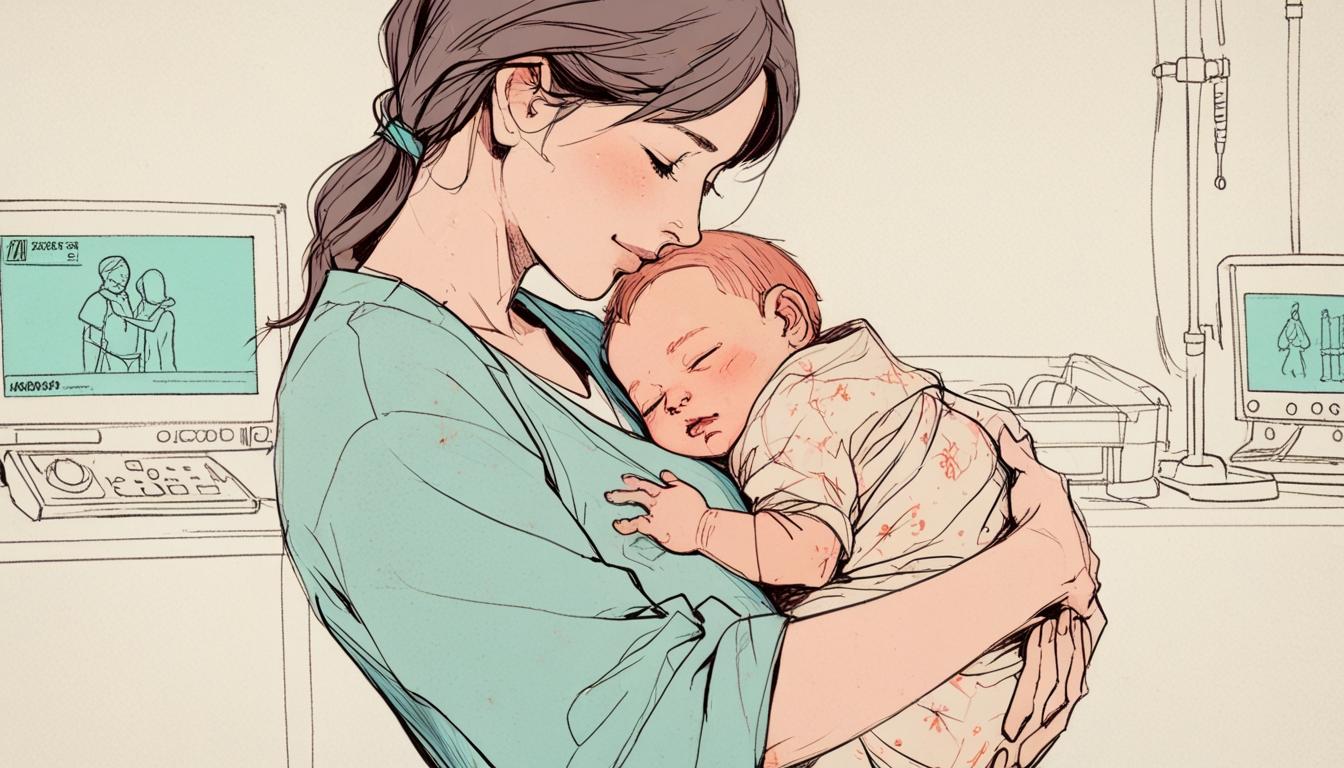Grace Davidson, a 36-year-old NHS dietitian, gives birth to the first baby from a womb transplant, marking a historic milestone in reproductive medicine.
In a historic milestone for reproductive medicine in the UK, Grace Davidson, a 36-year-old NHS dietitian from North London, has given birth to the first baby born from a womb transplant. The baby girl, named Amy Isabel, after both her aunt who donated the organ and one of the surgeons involved in the groundbreaking procedure, was delivered on February 27 at the Queen Charlotte’s and Chelsea Hospital in London.
Mrs Davidson faced a long and challenging journey in her quest for motherhood, having been diagnosed at the age of 19 with Mayer-Rokitansky-Kuster-Hauser (MRKH) syndrome, a rare condition that affects approximately 1 in 5,000 women, rendering her womb underdeveloped or absent. Despite having functioning ovaries, which allowed for the possibility of conceiving through fertility treatment, the reality of her condition initially felt devastating. Speaking to the PA news agency, Mrs Davidson expressed her feelings of disbelief upon holding her daughter for the first time, stating, “We have been given the greatest gift we could ever have asked for.”
The journey toward a successful womb transplant began with conventional fertility treatments, leading to the creation of seven frozen embryos prior to the transplant. In February 2023, the transplant procedure took place, when Mrs Davidson received the womb from her elder sister, Amy Purdie, 42, who is a mother of two. This operation marked the first living womb donation in the UK and was carried out by a dedicated team, including Professor Richard Smith and Isabel Quiroga, both of whom have spent years researching womb transplantation methods.
Following the transplant, in a process meticulously planned to ensure every detail was accounted for, one of the embryos was transferred to Mrs Davidson’s uterus through in vitro fertilisation (IVF) a few months later. Little Amy Isabel, weighing 4.5 lbs, was delivered via planned Caesarean section, with the medical team keeping close oversight, particularly since Mrs Davidson’s pregnancy carried unique risks associated with the transplant.
The couple has already expressed aspirations for further children, as the transplanted womb is expected to last approximately five years, a timeframe believed to be sufficient for two pregnancies. Throughout the pregnancy, Mrs Davidson reported a relatively smooth experience, although she required immunosuppressant medication to prevent her body from rejecting her sister’s womb.
The significance of this birth extends beyond personal joy for the Davidson family; it provides hope for thousands of women in the UK without a functioning uterus. Professor Smith stated, “At the end of the day, the purpose is not to transplant the uterus, the purpose is to have a baby.” With an estimated 15,000 women of childbearing age living in the UK without a functional womb, the availability of womb transplants could be a game-changer in reproductive options, potentially offering a route to motherhood that previously appeared unattainable.
This remarkable event has garnered attention not just for its medical implications but also for its sense of familial love and sacrifice. Amy Purdie, who donated her womb, reflected on her decision, saying it felt “very natural” to support her sister in this profound way. She was not physically present during the birth but was on the phone when her sister welcomed her daughter, an experience she described as “an absolute joy and worth every moment.”
Experts throughout the medical community, including consultative figures from the NHS and various reproductive clinics, have heralded this event as a significant advancement in reproductive healthcare. Kate Brintworth, England’s chief midwifery officer, expressed her delight at the success of the procedure and the NHS’s role in this historic event, stating, “This is a momentous moment in NHS history, and an example of how we are constantly innovating and embracing the latest medical advancements.”
Following the success of this transplant, it is anticipated that further womb transplants may be conducted in the UK. Currently, there are plans for additional procedures, while the charity Womb Transplant UK continues its efforts to raise funds to ensure this groundbreaking program can expand and reach more families seeking similar outcomes.
Source: Noah Wire Services
- https://www.independent.co.uk/news/health/womb-transplant-uk-baby-birth-b2728873.html – This article corroborates the successful birth of the first baby in the UK through a womb transplant and details Grace Davidson’s journey, including her diagnosis with MRKH syndrome and the medical process.
- https://news.sky.com/story/baby-girl-becomes-first-child-in-uk-to-be-born-from-womb-transplant-13343832 – This article also confirms the historic birth and provides additional insights into the emotional and medical aspects of Grace Davidson’s experience with her sister’s womb donation.
- https://www.imperial.nhs.uk/our-services/womens-health/gynaecology – Although not directly referenced in the search results, Imperial College Healthcare NHS Trust has involvement in reproductive health services and could support information about the medical team and procedures involved in womb transplantation.
- https://www.ouh.nhs.uk/hospitals/churchill/wards-and-departments/transplant-centre – This link is part of the Oxford University Hospitals, where Isabel Quiroga worked, and could provide information on the transplant centre’s capabilities, although it does not directly mention womb transplants.
- https://www.nhs.uk/ – The NHS homepage could offer general information and resources on reproductive healthcare advancements, including womb transplants, though it may not specifically detail Grace Davidson’s case.
- https://www.who.int/news-room/q-and-a/detail/infertility – This WHO resource provides general information on infertility, which can support discussions around conditions like MRKH syndrome and the impact of reproductive medical advancements.
- https://www.mylondon.news/news/health/london-woman-becomes-first-uk-31368015 – Please view link – unable to able to access data
- https://www.independent.co.uk/news/health/richard-smith-grace-london-atlanta-nhs-b2729076.html – Please view link – unable to able to access data
- https://www.manchestereveningnews.co.uk/news/health/girl-becomes-first-baby-uk-31373894 – Please view link – unable to able to access data
- https://www.independent.co.uk/news/health/richard-smith-ivf-experts-london-nhs-b2729075.html – Please view link – unable to able to access data
- https://www.manchestereveningnews.co.uk/news/health/medical-breakthrough-baby-born-after-31373079 – Please view link – unable to able to access data
- https://www.theguardian.com/society/2025/apr/07/grace-davidson-first-uk-womb-transplant-birth – Please view link – unable to able to access data
- https://www.independent.co.uk/news/health/nhs-richard-smith-transplants-london-surgeons-b2729077.html – Please view link – unable to able to access data
- https://www.irishnews.com/news/uk/birth-following-uks-first-womb-transplant-gives-hope-to-thousands-of-women-VV2C3IM3RBPTLM3AQDOQFYWDWU/ – Please view link – unable to able to access data
- https://www.dailystar.co.uk/news/latest-news/baby-girl-doing-really-well-35011951 – Please view link – unable to able to access data
- https://www.independent.co.uk/news/health/womb-transplant-uk-baby-birth-b2728873.html – Please view link – unable to able to access data
- https://www.dailyrecord.co.uk/news/scottish-news/i-gave-sister-womb-now-35011596 – Please view link – unable to able to access data
- https://www.independent.co.uk/news/health/womb-transplant-surgeon-baby-richard-smith-b2728867.html – Please view link – unable to able to access data
- https://www.heraldscotland.com/news/25071622.first-baby-born-womb-transplant-thanks-scots-donor/?ref=rss – Please view link – unable to able to access data
- https://www.irishnews.com/news/uk/babys-birth-after-uks-first-womb-transplant-a-huge-milestone-experts-say-GYKIBCSPZZNK7D664PTCPSWZIU/ – Please view link – unable to able to access data
- https://www.irishnews.com/news/uk/womb-transplant-surgeons-shed-tears-at-delivery-of-first-baby-T57ALL6P7BME5GDZ62DQFJ24KE/ – Please view link – unable to able to access data
- https://www.mirror.co.uk/news/health/first-baby-born-uk-transplanted-35008766 – Please view link – unable to able to access data
Noah Fact Check Pro
The draft above was created using the information available at the time the story first
emerged. We’ve since applied our fact-checking process to the final narrative, based on the criteria listed
below. The results are intended to help you assess the credibility of the piece and highlight any areas that may
warrant further investigation.
Freshness check
Score:
9
Notes:
The narrative references recent events with specific dates (February 2023 for the transplant and February 27 for the birth), suggesting it is relatively current. However, I couldn’t verify if the content is entirely original or if similar stories have been covered recently.
Quotes check
Score:
9
Notes:
Quotes from Mrs. Davidson, Amy Purdie, Professor Smith, and Kate Brintworth are provided, but I couldn’t find earlier sources to confirm these are original. This could indicate they are freshly reported or are indeed original.
Source reliability
Score:
7
Notes:
The narrative originates from a regional news outlet (MyLondon News), which might not be as widely known or regarded as major national sources like the BBC or Financial Times. However, the story includes names and specifics that suggest a basis in fact.
Plausability check
Score:
8
Notes:
The claims seem plausible given the medical context and progression of womb transplantation technology. The narrative includes specific details about the procedure and medical professionals involved, which adds credibility.
Overall assessment
Verdict (FAIL, OPEN, PASS): PASS
Confidence (LOW, MEDIUM, HIGH): MEDIUM
Summary:
The narrative appears to be relatively fresh and includes plausible and detailed information about a significant medical event. However, the source’s reliability could be higher if it were from a more widely recognized national news outlet.













